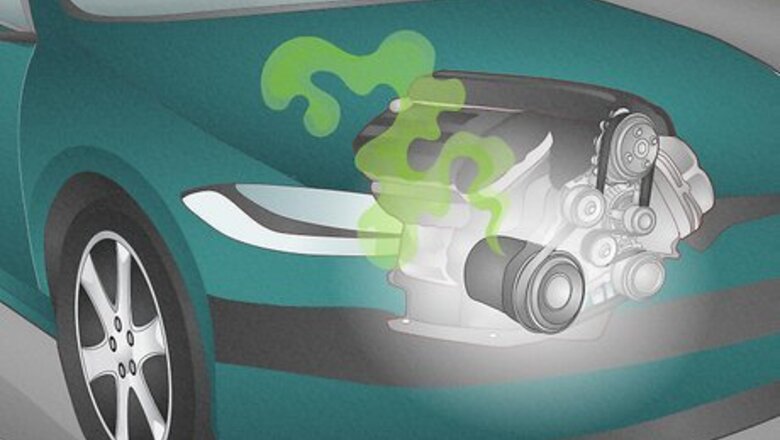
views
- Electrical issues, like damaged wires or burnt-out fuses, can cause an intense burning aroma.
- Note when the odor occurs. If it’s when you turn the AC on, your AC compressor or clutch is bad. If it’s when you brake, the brake pads are worn.
- If you see smoke alongside the odor, you’ve probably got an oil leak somewhere. Smoke in the back points to catalytic converter issues.
AC compressor or clutch seized up
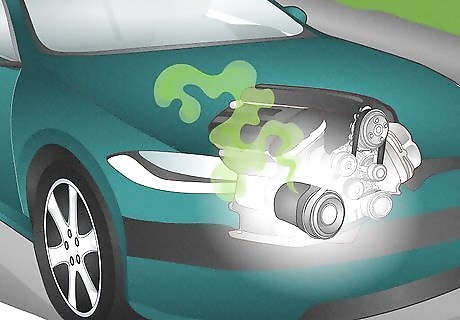
It could be the air conditioning’s clutch is burning up because it needs to be lubricated, or that the compressor is overloading. In any case, the AC will seize up if it isn’t working properly. Since it’s connected to the serpentine belt, a seized-up AC will cause the belt to burn and lead to your smoking odor. What it smells like: Burnt rubber, usually. Depending on your AC model you may smell chemicals from a freon leak, too. Other symptoms: The RPM dial moves when you turn the air on and the burning aroma is only present when the air is running. The fix: The AC system likely needs to be replaced. Expect to spend about $400-600 for minor repairs. If you need a new condenser, it can run anywhere from $1,000-2,500. Can you drive your car when it has a burning smell? No. Even if you identify what’s causing the odor, any burning smell means your vehicle could catch fire. It’s just not worth the risk to drive it.
Worn serpentine belt
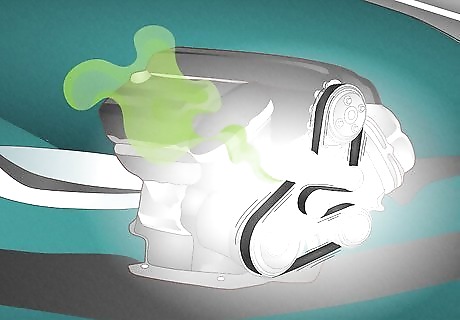
The serpentine belt, also known as the fan belt, runs around a variety of pulleys in your engine to power the AC, water pump, alternator, power steering pump, and other systems. If that belt is worn down, the friction can generate the burning aroma in your cabin. What it smells like: This will smell exclusively like rubber. Other symptoms: Squeaking or squealing noises, difficulty steering, high engine temperatures, and a check engine light. You won’t be able to drive with a bad belt. The fix: Either see a mechanic to swap the belt out or replace it yourself. It shouldn’t cost more than $100-200.
Clutch lining friction
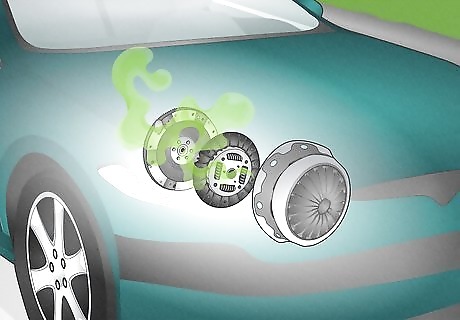
The clutch plate allows the transmission and engine to run at the same speed while you’re driving. As you can imagine, this involves a lot of spinning and rotating parts, which puts a lot of wear and tear on the clutch. As the clutch reaches the end of its life, you’ll smell the burning aroma in your car. What it smells like: Usually, clutch friction smells like sulfur. Some people think it smells a bit like gun smoke. Other symptoms: The smell gets worse on an incline, at a stoplight, or under hard acceleration as your transmission changes gears. The fix: You need a new clutch plate, at minimum. Unfortunately, this generally runs around $1,500.
Oil leak or spill

If you just changed your oil or added oil to your car, you may be smelling smoke as any drips or spills burn off. This isn’t a big deal. If you haven’t just added or changed oil, you likely have a leak somewhere. When oil burns off in your engine bay, it’ll cause a burning smell. What it smells like: It smells like oil, if that makes sense. Kind of a thick, car exhaust fume aroma. Other symptoms: The oil pressure gauge runs high, your oil pressure warning light is on, you hear engine knocking, and notice decreased engine performance. The fix: See a mechanic to have your oil lines tested and repaired. If you know you spilled a little oil, it should burn off in the next few minutes.
Worn brake pads
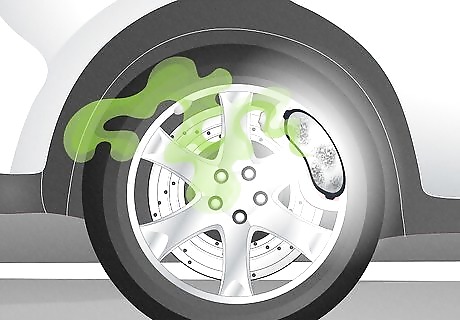
Brake pads may start to smell if they’re well past their healthy lifespan. The pads themselves have probably been ground down deep enough that you smell the smoke from the friction. However, it could be that your calipers are stuck or there’s something wrong with your hydraulic lines. What it smells like: Usually, a burning metallic aroma. Other symptoms: Your vehicle makes noise when you engage the brakes. Alternatively, you might notice sticky brakes or trouble The fix: See a mechanic to get your brakes fixed. Expect to spend around $300-800.
Bad electrical
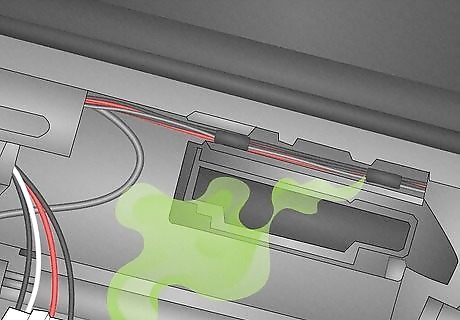
If electrical wires in your vehicle are damaged or failing, they’ll likely begin to overheat. When this happens, it can smell like smoke. Even blown fuses can start to give off a burning odor. These aren’t common, but electrical issues can develop if you’ve got an older car or it hasn’t been serviced in a while. What it smells like: Burning electrical aromas are distinct. A lot of people compare electrical fires and smoke to burning plastic. Other symptoms: It completely depends on which specific wires are affected, but the primary symptoms should be electrical in nature. You might have headlights out, a radio that doesn’t work, or windows that don’t close. The fix: See a mechanic. It’s hard to know what the fix or costs are without knowing what’s specifically wrong.
Dying heater core

The heater core is a small radiator that’s usually tucked behind a system of hoses and valves. It absorbs the used (hot) coolant so that it can be fed back into the antifreeze system. If the heater core leaks or starts dying, the hot coolant can cause debris in your engine bay to burn up. What it smells like: This will smell “dirty sweet;” a combination of butterscotch, graham crackers, and whatever dirt is burning away. Other symptoms: Your engine runs a little hot, you see leaks underneath your vehicle, and there’s foggy smoke bleeding into your car. The fix: You need a new heater core. See a mechanic to have it installed and hooked up to the antifreeze system. Expect to spend around $1,000 on this.
Exhaust leak
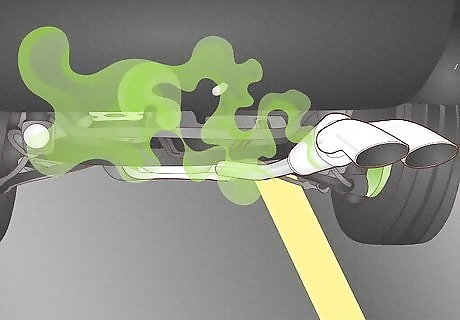
Your exhaust system is designed to get rid of all of the exhaust gases generated by your vehicle when you drive. It uses a series of pipes, sensors, and exhaust valves to safely get rid of the toxic fumes. However, if there’s a leak anywhere in that system, it may cause your vehicle to smell like something is burning. What it smells like: It can depend a little on what specifically is leaking, but it will be unpleasant. Exhaust fumes will most likely smell like rotten eggs. Other symptoms: Your vehicle is louder than it used to be, your car shakes, and you get poor gas mileage. The fix: See a mechanic. Depending on where your leak is, this may cost anywhere from $50 to $500.
Bad catalytic converter
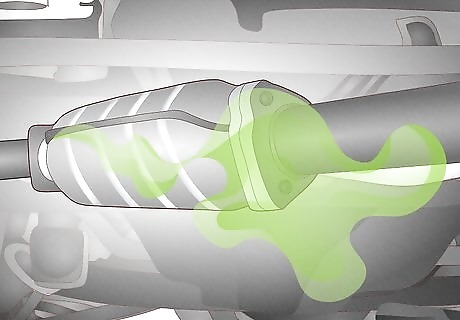
The catalytic converter is a unique component of your exhaust system. Filled with minerals and absorbent chemicals, the catalytic converter is designed to soak up all of the gnarly, toxic fumes so that they don’t end up in the environment. If that converter is damaged (or stolen), you’ll smell burning all around your vehicle. What it smells like: Pungent sulphur and toxic fumes. Catalytic converter fumes are very noticeable and super gnarly. Other symptoms: Your check engine light pops on and there are smoke fumes coming from the back of your vehicle. The fix: You need a new catalytic converter. Unfortunately, this can cost up to $3,000 depending on your vehicle model.
Poor door or window seal

If your car is especially old or you’ve been in a crash and had to have the vehicle’s body reconstructed, the seal separating your doors and/or windows from the outside (or your engine bay) may not be completely sealed. What you may be smelling is just your engine operating normally—it’s just that you aren’t used to smelling it with the windows closed. What it smells like: This is probably just going to smell vaguely like gas. Other symptoms: None. Depending on where the leak is, you may hear a slight buzzing or humming that gets louder the faster you go (just from the air passing through the gap). You may notice water inside your vehicle after it rains depending on the gap location. The fix: If you can locate the gap, duct tape will fix the problem temporarily. Alternatively, you can go to see a mechanic or body repair shop to have the seal fixed.




















Comments
0 comment